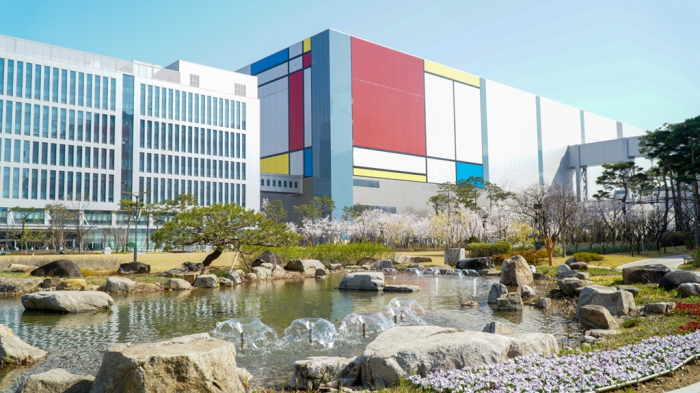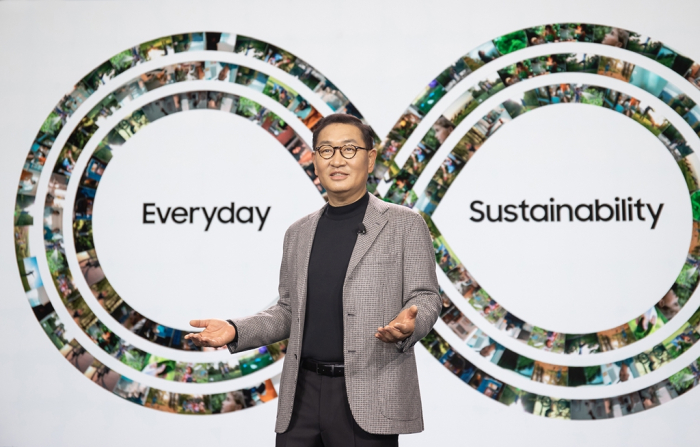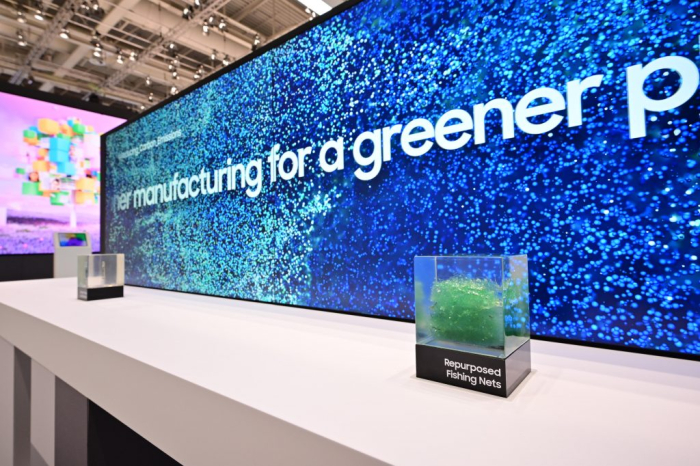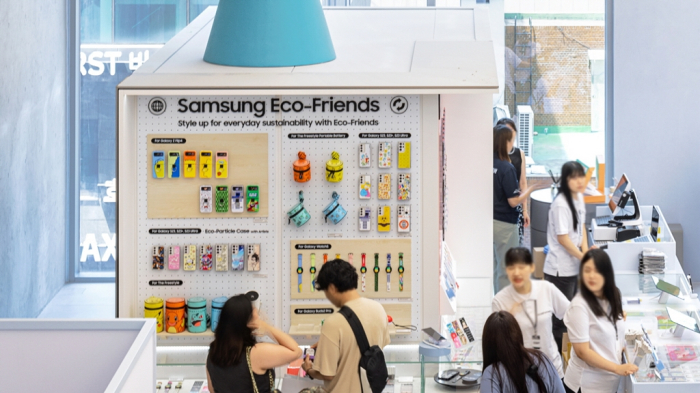Samsung Electronics on track to achieve carbon neutrality by 2050
One year after announcing its sustainable growth strategy, its efforts have already moved it closer to its ambitious goal
By Sep 13, 2023 (Gmt+09:00)
LG Chem to sell water filter business to Glenwood PE for $692 million


Kyobo Life poised to buy Japan’s SBI Group-owned savings bank


KT&G eyes overseas M&A after rejecting activist fund's offer


StockX in merger talks with Naver’s online reseller Kream


Mirae Asset to be named Korea Post’s core real estate fund operator


Come Friday, Samsung Electronics Co., the world’s largest memory chipmaker, will mark its first anniversary of publicly announcing its enterprise-wide commitment to achieving carbon neutrality by 2050.
At the heart of the commitment is to achieve net zero carbon emissions at all operations in its Device eXperience (DX) division by 2030 and across all global operations, including the Device Solutions (DS) division, by 2050.
The DX division encompasses the company’s consumer electronics, smartphone, display and network businesses while the DS division includes the memory, system LIS and foundry businesses.
By joining the RE100, a global initiative to cut indirect carbon emissions, in 2022, Samsung has doubled down on its efforts to use renewable energy.
The DX division is using 100% renewable energy at all its domestic business sites as well as at its operations in Vietnam, India and Brazil.

The company’s renewable energy conversion rate last year was 31% and its renewable energy use worldwide stood at 8,704 gigawatt hours (GWh) in 2022, up 65% from the year prior.
Samsung plans for all of its overseas operations to be 100% powered by renewable energy and use electric vehicles and hydrogen-powered cars for all business purposes by 2027.
Last year, it reduced greenhouse gas emissions by 10.16 million tons, up 59% from the previous year.
$5.3 BILLION INVESTMENT IN RECYCLING, WATER REUSE
Samsung said last year it will invest more than 7 trillion won ($5.3 billion) by 2030 to develop technologies to reduce emissions from process gases, a byproduct of semiconductor manufacturing, and to collect and recycle waste electronics goods and maximize water reuse.
The investment excludes costs related to the expansion of renewable energy use.

Samsung is also committed to water resource efficiency.
As chip manufacturing capacity expands, daily water withdrawal needs from Samsung’s semiconductor operations in Korea are expected to double by 2030 from the current levels.
However, the company has pledged to optimize water reuse, maintaining water withdrawals at its 2021 levels.
Last year, the amount of its water reuse reached 116.6 million tons, up 29% from the previous year.
CIRCULAR ECONOMY
By 2030, the company aims for 50% of the plastic used in its products to incorporate recycled resin. The year 2050 will see this figure increase to 100%, it said.
Samsung said its use of plastics containing recycled resin reached 98,826 tons in 2022 – a threefold increase from 2021.

To address sustainability after product use, the company plans to expand the scope of its electronic waste collection system from the current 50 countries to 180 countries by 2030.
Through this, it plans to collect 10 million tons of electronic waste in total between 2009 and 2030 – the highest target in the industry and a cumulative 25 million tons by 2050.
Last year, it collected 600,502 tons of electronic waste, bringing its total since 2009 to 5.69 million tons.
Samsung plans to apply its carbon capture technology to its chipmaking facilities in 2030 and expand it to overall company facilities and its partners afterward.
EMPLOYEE IDEAS
The company is pulling its executives and employees together to put carbon neutrality ideas into action.

To lessen leftover food at the company cafeteria, Samsung used artificial intelligence (AI) technology to estimate the amount of leftover food and reduce the ratio of less popular dishes.
Samsung employees are also asked to bring unused eco-friendly bags and tumblers at home to work and donate them to welfare facilities.
They are also encouraged to cut the use of packaging for office supplies and use recycled, reusable boxes and paper packaging instead.
Through this, Samsung expects to save 370 million tons of paper boxes and 2.2 km of packaging tape by the end of this year.
Write to Jeong-Soo Hwang at hjs@hankyung.com
In-Soo Nam edited this article.
-
 ESGESG: Name of the game in investing, funding amid Korea’s green push
ESGESG: Name of the game in investing, funding amid Korea’s green pushMar 16, 2023 (Gmt+09:00)
2 Min read -
 EnergyLG, SK, Hanwha accelerate shift to renewable energy with push for RE100
EnergyLG, SK, Hanwha accelerate shift to renewable energy with push for RE100Feb 10, 2021 (Gmt+09:00)
3 Min read -
 Carbon neutralitySamsung Electronics to announce plans to join RE100 Initiative
Carbon neutralitySamsung Electronics to announce plans to join RE100 InitiativeAug 14, 2022 (Gmt+09:00)
3 Min read


